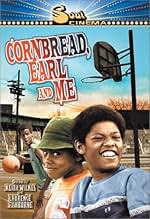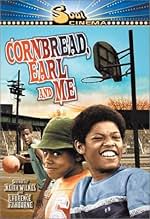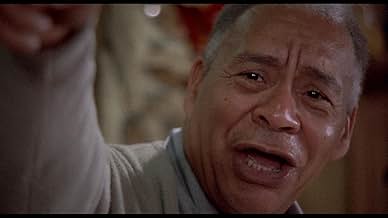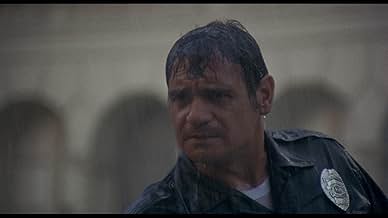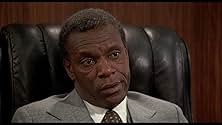IMDb-BEWERTUNG
6,9/10
1135
IHRE BEWERTUNG
Füge eine Handlung in deiner Sprache hinzuA 12-year-old is traumatised by the murder of his friend, a star basketball player.A 12-year-old is traumatised by the murder of his friend, a star basketball player.A 12-year-old is traumatised by the murder of his friend, a star basketball player.
- Regie
- Drehbuch
- Hauptbesetzung
Jamaal Wilkes
- Nathaniel 'Cornbread' Hamilton
- (as Keith Wilkes)
Laurence Fishburne
- Wilford Robinson
- (as Laurence Fishburne III)
Empfohlene Bewertungen
CE&M is a movie whose story is better than its performances. Cornbread is played by Keith Wilkes who later became Jamaal Wilkes the hall of fame basketball player. As to be expected, he wasn't very strong as an actor. He plays a basketball player, which is not acting.
Earl is played by Tierre Turner, a kid who looked no older than twelve. His part was small even though his name is in the title.
The "Me" in the title is Wilford Robinson (Laurence Fishburne). Sure, he's a great actor now, but he was just passable then.
I don't want to be remiss and forget to mention the veteran actors Bernie Casey, Moses Gunn, and Rosalind Cash. They were all good and lended some much needed credence to the movie.
As for the storyline, Cornbread is a young high school graduate who is going to college in the fall on a full scholarship for basketball. He is a good kid who eats, sleeps, and drinks basketball. He literally has no time for anything else he's so consumed with it. When he gets killed by the police in a case of mistaken identity it sparks outrage from the people and an equal and opposite stonewall stance from the police and the city.
It is a tragic story that squeezes the heart and puts fire in the belly. I like movies that can do that.
The movies I watch that can elicit strong reactions are either bad movies that are so bad I'm just upset, or good movies that put the viewer in the exact state they want them to be in. CE&M does just that in spite of the so-so acting.
Earl is played by Tierre Turner, a kid who looked no older than twelve. His part was small even though his name is in the title.
The "Me" in the title is Wilford Robinson (Laurence Fishburne). Sure, he's a great actor now, but he was just passable then.
I don't want to be remiss and forget to mention the veteran actors Bernie Casey, Moses Gunn, and Rosalind Cash. They were all good and lended some much needed credence to the movie.
As for the storyline, Cornbread is a young high school graduate who is going to college in the fall on a full scholarship for basketball. He is a good kid who eats, sleeps, and drinks basketball. He literally has no time for anything else he's so consumed with it. When he gets killed by the police in a case of mistaken identity it sparks outrage from the people and an equal and opposite stonewall stance from the police and the city.
It is a tragic story that squeezes the heart and puts fire in the belly. I like movies that can do that.
The movies I watch that can elicit strong reactions are either bad movies that are so bad I'm just upset, or good movies that put the viewer in the exact state they want them to be in. CE&M does just that in spite of the so-so acting.
Jamaal Wilkes, Laurence Fishburne (in his first big-screen role), and Tierre Turner are shooting hoops when it begins to rain. They go into Charles Lampkin's store, and Wilkes buys treats for the other boys. He's in a good mood, because he's the first in the neighborhood who will go to college, on a football scholarship, and he will be going tomorrow. They start to banter about how fast he is, and he starts to run home in the rain. Police officers, pursuing a suspect, mistake Wilkes. They shoot him dead.
It's Moses Gunn whom Madge Sinclair and Stack Pierce, Wilkes' parent hire to get the Police admit they made a mistake, and it's Rosalind Cash, Fishburne's mother, who nurtures him. Some of the roles, like Stefan Gierasch as the cop who intimidates witnesses, are pretty much stereotypes, but that's the point of this movie: to see the Black people in it as individuals. Despite an occasionally clunky pacing, it does that very well.
It's Moses Gunn whom Madge Sinclair and Stack Pierce, Wilkes' parent hire to get the Police admit they made a mistake, and it's Rosalind Cash, Fishburne's mother, who nurtures him. Some of the roles, like Stefan Gierasch as the cop who intimidates witnesses, are pretty much stereotypes, but that's the point of this movie: to see the Black people in it as individuals. Despite an occasionally clunky pacing, it does that very well.
A kid witnesses the shooting death of the neighborhood basketball star. The basketball player had been mistaken by the police as a crime suspect. The kid is subjected to harrassment from the policement involved to keep quiet about what he knows. The cops even go so far as to intimidate his mother. This is an early film appearance of Lawrence Fishburne's. He was thirteen or fourteen when he did this movie. The always magnificent late Rosalind Cash plays his mother. The film makes a sharp comment about the conflicts people have with the very people who are supposed to be protecting them.
Intermittently powerful, all-too-familiar social-problem realism and maudlin melodrama, "Cornbread, Earl and Me" is, either way, a melancholic affair. The overwrought histrionics, overly-optimistic resolution, and some poor acting are especially unfortunate given how moving the best scenes are here. The rainy killing by policemen and subsequent attack on those murderous officers by the neighborhood is a strong scene--ever more shockingly so as it comes after a dull first act. Moreover, it's well foreshadowed by prior unlawful actions by the cops in harassing and unwarranted searching of suspected criminals. The subsequent intimidation of witnesses leading up to the courtroom conclusion is in way familiarly spot on, too, as the police department and city officials close ranks to obstruct justice and protect their own, but it also often veers over-the-top, as does much of the rest of the picture.
Rather surprisingly given that they cast would-be NBA Hall-of-Famer Jamaal Wilkes that the basketball scenes, or single brief montage rather, are scant and unimpressive. It seems evident he wasn't cast for his acting abilities, after all, and is in good company there with other sports legends. (Not everyone is as fortunate as Wilkes's Lakers teammate Kareem Abdul-Jabbar, to be memorably cast in "Airplane!" (1980), and some face the far more reprehensible fate of appearing in a "Space Jam" burger (1996 and 2021).) The gee-wiz simplistic saintliness of Wilkes's "Cornbread" is of eye-rolling annoyance. And, those poor neighbors putting up with his dribbling a basketball in his flat on his way to an athletic scholarship. Either that apartment building was constructed with some of the best in sound-proofing floor and walls or those neighbors are unsung heroes.
Laurence Fishburne also made his debut here, and evidently he could act even as a child, or at least it seems that way by comparison to the actress, Rosalind Cash, playing his mother, who is the most prominent offender here of some very poor, soap-opera levels of acting (and, indeed, Cash's career ended with a role on daytime soap "General Hospital"). They should've cut the candy bar theft scene that results in her ridiculously weeping over her kid stealing 15 cents worth of merchandise. I get the point of the scene--everyone gets the obvious intent of it--to establish Wilford's, the "Me" protagonist of the title, maturing sense of ethics, but there are better ways to accomplish as much without constantly hitting the audience over the head with the cinematic equivalent of a sledge hammer. Perhaps, this is a product of its era, as much of the representation of African Americans on screen was in blaxploitation flicks, so subtlety doesn't seem to have been valued much, but this material was and is still is socially-relevant and powerful enough to do without the dramatic cop-outs.
Rather surprisingly given that they cast would-be NBA Hall-of-Famer Jamaal Wilkes that the basketball scenes, or single brief montage rather, are scant and unimpressive. It seems evident he wasn't cast for his acting abilities, after all, and is in good company there with other sports legends. (Not everyone is as fortunate as Wilkes's Lakers teammate Kareem Abdul-Jabbar, to be memorably cast in "Airplane!" (1980), and some face the far more reprehensible fate of appearing in a "Space Jam" burger (1996 and 2021).) The gee-wiz simplistic saintliness of Wilkes's "Cornbread" is of eye-rolling annoyance. And, those poor neighbors putting up with his dribbling a basketball in his flat on his way to an athletic scholarship. Either that apartment building was constructed with some of the best in sound-proofing floor and walls or those neighbors are unsung heroes.
Laurence Fishburne also made his debut here, and evidently he could act even as a child, or at least it seems that way by comparison to the actress, Rosalind Cash, playing his mother, who is the most prominent offender here of some very poor, soap-opera levels of acting (and, indeed, Cash's career ended with a role on daytime soap "General Hospital"). They should've cut the candy bar theft scene that results in her ridiculously weeping over her kid stealing 15 cents worth of merchandise. I get the point of the scene--everyone gets the obvious intent of it--to establish Wilford's, the "Me" protagonist of the title, maturing sense of ethics, but there are better ways to accomplish as much without constantly hitting the audience over the head with the cinematic equivalent of a sledge hammer. Perhaps, this is a product of its era, as much of the representation of African Americans on screen was in blaxploitation flicks, so subtlety doesn't seem to have been valued much, but this material was and is still is socially-relevant and powerful enough to do without the dramatic cop-outs.
Seeing that this is one of the first, if not the first, Hollywood movies fully to address the issue of police brutality toward African Americans, a problem that remains unsolved, I am inclined to cut this film a whole lot of slack. I am willing to overlook the Lorraine Hansbury wannabe dialogue and over the top acting, surprising for such a distinguished cast. I will even forgive the bombastic, intrusive music score. Because, however crudely at times, director Joe Manduke conveys the feel of a community oppressed as well as the difficulty of and need to stand up to the oppressor. So that by the end of the film one is both angered and stirred. And not spuriously, either Give it a B minus.
PS...One exception to the general histrionics of the acting is a very young Laurence Fishburne whose testimony at the inquest is, by far, the film's best scene. That it is also the only one without music is not, in my view, coincidental.
PS...One exception to the general histrionics of the acting is a very young Laurence Fishburne whose testimony at the inquest is, by far, the film's best scene. That it is also the only one without music is not, in my view, coincidental.
Wusstest du schon
- WissenswertesLaurence Fishburne's film debut. He is credited as Laurence Fishburne III.
- PatzerWhen a clay pot is thrown at Officer Atkins and hits the windshield of his cruiser, it breaks. Pieces of glass hit Atkins and embed in his face. But windshields are made of safety glass and though windshields break, they keep the glass in place. So, the glass in this windshield would NOT have flown at Atkins, let alone embed in his face. He would have come out of this situation shaken but physically unharmed.
- Zitate
Wilford Robinson: ...they killed Cornbread and he wasn't doin' nothin'
[pause]
Wilford Robinson: all he was doin wuz jus goin' home...
- VerbindungenFeatured in Dusk to Dawn Drive-In Trash-o-Rama Show Vol. 2 (1996)
Top-Auswahl
Melde dich zum Bewerten an und greife auf die Watchlist für personalisierte Empfehlungen zu.
- How long is Cornbread, Earl and Me?Powered by Alexa
Details
- Erscheinungsdatum
- Herkunftsland
- Offizieller Standort
- Sprache
- Auch bekannt als
- Hit the Open Man
- Drehorte
- Produktionsfirmen
- Weitere beteiligte Unternehmen bei IMDbPro anzeigen
Box Office
- Budget
- 800.000 $ (geschätzt)
Zu dieser Seite beitragen
Bearbeitung vorschlagen oder fehlenden Inhalt hinzufügen

Oberste Lücke
By what name was Cornbread, Earl and Me (1975) officially released in India in English?
Antwort

